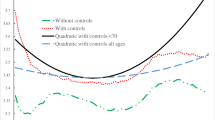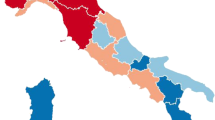Abstract
The way of life is a topic of central interest in present Hungarian sociology. The time budget survey is considered to be a good method to investigate the way of life. A national survey was performed in 1976–1977. Its results can be compared to an earlier national survey in 1963. The main characteristics of the way of life and the main changes are: The time spent at the workplace changed more slowly than the statutory working time. Income-supplementing working activities are very widespread, most of all in small agricultural plots. These plots are cultivated by almost all social strata residing in villages. The total amount of time spent in household chores diminished and became somewhat more equally shared by women and men. The length of daily contracted and commited time is strongly differentiated by social strata and this differentiation tended to increase.
Similar content being viewed by others
Bibliography
Szántó, M. (ed.): 1978, Életmódkutatás a szocialista országokban [Research on the Way of Life in Socialist Countries], (Budapest, Kossuth).
Sufin, Z. and Cipko, A. (ed.): no date, Problemy issledovaniya obraza zhizni v socialisticheskih stranah (Warsaw, Instytut Filosofii i Socjologii PAN).
Cseh-Szombathy, L. and Kulcsar, K.: 1979, A szocialista életmód ismérvei, feltételei, fejlődési tendenciái [Characteristics, Conditions and Development Tendencies of the Socialist Way of Life], (Budapest).
Losonczi, Á.: 1973, Az életmódról. Az anyagi feltételek, a mindennapi aktivitás és az emberi együttélés kérdései [On the Way of Life, the Material Conditions, the Everyday Activities and the Problems of Human Contacts], (Budapest, MTA Szociológiai Kutató Intézet).
Losonczi, A.: 1977, Az életmód az időben, a tárgyakban és az értékekben [The Way of Life in Time, in Objects and in Values], (Budapest, Gondolat).
H. Sas, J.: 1973, Eletmód és család. Az emberi viszonyok alakulása a csaladban [Way of Life and Family. The Human Relations in the Family], (Budapest, MTA Szociológiai Kutató Intézet).
Köpeczi, B.: 1976, ‘Életmód és tudat’ [‘Way of Life and Consciousness’], Társadalmi Szemle 31, pp. 76–83.
Szántó, M.: 1977, ‘Thoughts on the socialist way of life’ in Szántó, M. (ed.): Ways of Life. Hungarian Sociological Studies (Budapest, Corvina), pp. 352–389.
Csőregh, É.: 1978, Lakótelepi iskolások. Életmód, szabadidő, nevelés [School-children Living in Housing Estates. Way of Life, Leisure Education], (Budapest, Akadémiai Kiadó).
Mód, A.: 1978, ‘“Bejáró” életmód — cél és valóság’ [‘Commuting way of life — goal and reality’], Társadalmi Szemle 33, pp. 67–76.
Marx, K. and Engels, F.: 1976, A német ideológia [German Ideology], (Budapest, Kossuth).
Engels, F.: 1971, A munkásosztály helyzete Angliában [The Situation of the Working Class in England], (Budapest, Kossuth).
Weber, M.: 1976 Gazdaság és társadalom. Szemelvények [Economy and Society. Selections], (Budapest, Közgazdasági és Jogi Könyvkiadó).
Bestushev-Lada, I.V.: 1975, ‘O metodologii analiza i prognoza obraza zhizsni’, Sociologischeskie Issledovania 1, pp. 183–189.
Szalai, A.: 1980, ‘The meaning of comparative research on the quality of life’, In: Szalai, A. and Andrews, F. M. (eds.): The Quality of Life: Comparative Studies, (London, Sage), pp. 7–21.
Cseh-Szombathy, L. and Surányi, B.: 1974, ‘Az életmód statisztikai vizsgálatának néhány kérdése’ [‘Some questions on the statistical investigation of the way of life’], Statisztikai Szemle 52, pp. 331–339.
Bolgov, V. I.: 1964, Vnerabocheie vremia i uroven zhizni trudiaschihsia [Novosibirsk, AN SSSR Sibirskoe Otdelenie].
Petrosian, G. S.: 1965, Vnerabocheie vremia trudiaschihsia v SSSR (Moscow, Economicy).
Patrusev, V. D.: 1963, Intenzivnost truda pri socializme (Moscow, Ekonomizdat).
Volkov, G. N.: 1965, Era robotov ili era cheloveka? (Moscow, Politizdat).
Gordon, L. A. and Klopov, E. V.: 1977, ‘Racionalny budzhet vremeni: podhod k probleme i opyt nachalnogo rascheta, Sociologicheskie Issledovania 1, pp. 19–30.
Dumnov, D. and Romanov, A.: 1980, ‘Statistika budzheta vremeni naselenia’, Vestnik Statisztiki 10, pp. 24–40.
Wnuk-Lipinski, E.: 1972, Praca i wypoczynek w budzecie czasu (Wroclaw, Ossolineum).
Adamczuk, L.: 1978, Budzet czasu mieszkanoców Polski (Warszawa, GUS).
Grazia, S.: 1962, Of Time, Work and Leisure (New York, Twentieth Century Fund).
Rowntree, B. S. and Lawers, G. R.: 1952, English Life and Leisure. A Social Study (London, Longmans-Green).
Young, M. and Willmott, P.: 1973, The Symmetrical Family (Harmondsworth, Penguin).
Dumazedier, J.: 1962, Vers une civilisation du loisir? (Paris, Seuil).
Falussy, B. (ed.): 1972, Szabadidő és müvelődés [Leisure and Cultural Activities], (Budapest, TIT).
Falussy, B. (ed.): 1976, A szabadidő szociológiája [Sociology of Leisure], (Budapest, Gondolat).
Central Statistical Office: 1962, A nők helyzete a munkahelyen és otthon [The Conditions of Women at Work and at Home], (Budapest, KSH).
Mód, A.: 1962, ‘A nők helyzete a munkahelyen és otthon’ [‘The conditions of women at work and home’], Statisztikai Szemle 40, pp. 791–811.
Ferge, S.: 1962, ‘A gyermekekkel kapcsolatos néhány kérdés a statisztika tükrében’ [‘Some questions relating to children on the basis of statistical data’], Statisztikai Szemle 40, pp. 967–992.
Central Statistical Office: 1965, A nap 24 órája. 12 000 ember napi időbeosztása [The 24 Hours of the Day. The Daily Use of Time of 12 000 Persons], (Budapest, KSH).
Ferge, S.: 1965, ‘Munkanapok és pihenőnapok’ [‘Working Days and Work Free Days’], Valóság 8, pp. 58–65.
Ferge, Zs.: 1969, Társadalmunk rétegződése. Elvek és tények. [The Stratification of Our Society. Principles and Facts], (Budapest, Közgazdasági és Jogi Könyvkiadó).
Cseh-Szombathy, L., Ferge, S.: 1967, ‘Egy nemzetközi időmérlegkutatás néhány eredménye’ [‘Some results of an international time budget survey’], Statisztikai Szemle 45, pp. 304–318.
Szalai, A. (ed.): 1972, The use of Time: Daily Activities of Urban and Suburban Populations in Twelve Countries (The Hague, Mouton).
Szalai, S. (ed.): 1978, Ido a mérlegen [Time Budget], (Budapest, Gondolat).
Szalai, S.: 1964, Idő a mérlegen. Az idő társadalmi megitélése és a szociológiai időmérleg-vizsgálatok néhány tapasztalata’ [‘Time budget. The social evaluation of time and some results of the sociological time budget surveys’], Valóság, 3, pp. 11–25.
Gazsó, F., Pataki, F., and Várhegyi, Gy.: 1971, Diákéletmód Budapesten, [Way of Life of Pupils in Budapest] (Budapest, Gondolat).
Szentirmai, L.: 1976, Egyetemi hallgatók Szegeden [Students in Szeged] (Budapest, Gondolat).
Ferge, Zs., Gazsó, F., Háber, J., Tánczos, G., and Várhegyi, Gy.: 1972, A pedagógusok helyzete és munkája, [The Situation and Work of Teachers], (Budapest, MTA Szociológiai Kutató Intézet).
Ferge, Zs. (ed.): 1979, Pedagógusok és tanulók a szakmunkásképzésben. II. kötet, A tanulók és pedagógusok időmérlegei [Teachers and Pupils in the Education of Skilled Workers. Vol. II. The Time Budget of Pupils and Teachers], (Budapest, MTA Szociológiai Kutató Intézet).
Tomka, M.: 1978, A tévénézés és rádióhallgatés a napi tevékenységek rendszerében [The TV and the Radio in the System of Daily Activities], (Budapest, Tömegkom-munikációs Kutatóközpont).
Oros, I., and Schindele, M.: 1977, ‘Időmérleg a háztáji és kisegitő gazdaságokban’ [‘Time Budget in the Household and Auxiliary Plots’], Statisztikai Szemle 55, pp. 846–863.
Andorka, R.: 1979, A magyar községek társadalmának átalakulása [Transformation of the Society of Hungarian Villages], (Budapest, Magvető).
Boh, K. and Saksida, S.: 1972, ‘An attempt at a typology of time use’, in: Szalai, A. (ed.): Use of Time: Daily Activities of Urban and Suburban Populations in Twelve Countries (The Hague, Mouton). pp. 229–247.
Central Statistical Office: 1977, Mundaidő-teljesitmények és munkaidő-veszteségek a népgazdaság szocialista szektorában [Working Time Inputs and Working Time Losses in the Socialist Sector of the Economy], (Budapest, KSH).
Additional information
The original Hungarian article was published in Statisztikai Szemle 58 (1980), 828–842 and 949–971.
Rights and permissions
About this article
Cite this article
Andorka, R., Falussy, B. The way of life of the Hungarian society on the basis of the time budget survey of 1976–1977. Social Indicators Research 11, 31–74 (1982). https://doi.org/10.1007/BF00353591
Received:
Issue Date:
DOI: https://doi.org/10.1007/BF00353591




